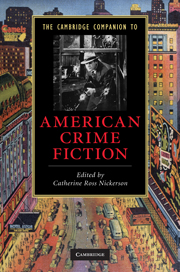Book contents
- Frontmatter
- 1 Introduction: The satisfactions of murder
- 2 Early American crime writing
- 3 Poe and the origins of detective fiction
- 4 Women writers before 1960
- 5 The hard-boiled novel
- 6 The American roman noir
- 7 Teenage detectives and teenage delinquents
- 8 American spy fiction
- 9 The police procedural in literature and on television
- 10 Mafia stories and the American gangster
- 11 True crime
- 12 Race and American crime fiction
- 13 Feminist crime fiction
- 14 Crime in postmodernist fiction
- Guide to reading
- Index
8 - American spy fiction
Published online by Cambridge University Press: 28 September 2010
- Frontmatter
- 1 Introduction: The satisfactions of murder
- 2 Early American crime writing
- 3 Poe and the origins of detective fiction
- 4 Women writers before 1960
- 5 The hard-boiled novel
- 6 The American roman noir
- 7 Teenage detectives and teenage delinquents
- 8 American spy fiction
- 9 The police procedural in literature and on television
- 10 Mafia stories and the American gangster
- 11 True crime
- 12 Race and American crime fiction
- 13 Feminist crime fiction
- 14 Crime in postmodernist fiction
- Guide to reading
- Index
Summary
Unlike British spy fiction which has tended to concern itself with issues of empire, the spy in American writing initially carried the status of a fighter for independence. James Fenimore Cooper's The Spy: A Tale of the Neutral Ground (1821), generally taken as the prototype of the genre, is concerned with distinguishing its protagonist from a “common spy,” as Cooper explained in his 1831 introduction. The novel centers on the activities of Harvey Birch, an American who uses his occupation as a peddler to travel between the rival forces during the War of Independence and gather information on the whereabouts of the English soldiers. The prevailing ethic in The Spy of military honor is based on overt bravery, in other words on the very quality which Birch's role debars him from showing. Others may declare their loyalty verbally; he has to screen his commitment behind the discourse of trade, even at the risk of being pronounced a traitor. Others wear the uniform of their calling; he goes through a whole series of disguises. Birch performs like an actor within an uncongenial context. Cooper thus, like many succeeding crime and mystery novelists, has to nudge the reader toward revelatory details, but without giving too much away. Throughout the novel he exploits incomplete lighting where figures - especially Birch - cannot be seen clearly; and he draws our attention to dress, especially the clothing which muffles the face of Birch.
- Type
- Chapter
- Information
- The Cambridge Companion to American Crime Fiction , pp. 86 - 95Publisher: Cambridge University PressPrint publication year: 2010
- 1
- Cited by

